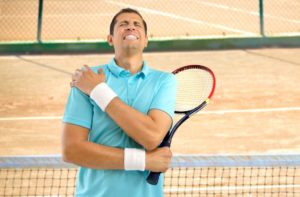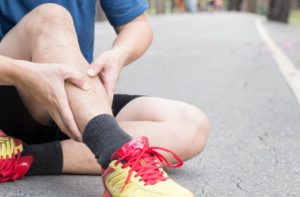 Do you love playing sports? A 2019 study by the Bureau of Labor Statistics reported that 19.3 percent of the U.S. population participated in a sport daily. Participating in sports helps improve overall health but also has a significant impact on improving cardiovascular endurance. Keeping your heart healthy is essential to a long and healthy life. Being on a sports team helps build social skills, teamwork, and leadership skills in both adults and children.
Do you love playing sports? A 2019 study by the Bureau of Labor Statistics reported that 19.3 percent of the U.S. population participated in a sport daily. Participating in sports helps improve overall health but also has a significant impact on improving cardiovascular endurance. Keeping your heart healthy is essential to a long and healthy life. Being on a sports team helps build social skills, teamwork, and leadership skills in both adults and children.
Sports are incredibly popular but can result in acute injuries and even severe or chronic conditions if injuries are ignored or undiagnosed. Our AICA Atlanta physicians and specialists can help with prompt diagnosis and treatment to encourage healing and remaining pain-free into the future.
The Centers for Disease Control and Prevention (CDC) reports around 30 million children and teens in the U.S. participate in sports. Of the 30 million reported, 2 million of the teens reported injuries due to sports activities.
Injuries as a result of playing a sport happen incredibly regularly. Injuries are more common in high-speed and high-intensity sports like football, basketball, and soccer. In a 2019 study, the three areas of the body with the highest rate of injury were ankles, knees, and shoulders.
Unfortunately, not all injuries are reported, usually because the injured player does not seek out treatment from a doctor. The risk of complications, chronic pain, and inability to play sports increases when an injury goes untreated. It is important to schedule an appointment with an orthopedist, neurologist, or chiropractor at AICA Atlanta if you suspect you have suffered an injury. However, not all injuries are immediately apparent. Below are five commonly missed signs of a sports injury.
#1 Muscle Pain
 Muscle pain is often ignored because people equate muscle aches with working out. It can be a real sign of injury. However, muscle pain is a symptom and can be the first indicator of an injury. This is especially true if the pain is ongoing, severe, or worsening.
Muscle pain is often ignored because people equate muscle aches with working out. It can be a real sign of injury. However, muscle pain is a symptom and can be the first indicator of an injury. This is especially true if the pain is ongoing, severe, or worsening.
If you are experiencing muscle pain or neglecting a warm-up before activity, this is an even more pertinent indicator of injury.
Despite its prevalence in other areas of your life, it is important to pay attention to muscle pain. People are prone to ignoring it more if it occurs while working out, during sports practice, or while competing. Make notes of the pain you are feeling and if it worsens, persists, or progresses. These could indicate a more serious injury that needs to be evaluated by an orthopedist. If you can link your muscle pain to a non-injury-related cause, you may be faster to brush it off, but it’s worth getting checked out regardless.
Common non-injury causes of muscle pain include:
- Sleeping in an awkward or unusual position
- Medications with side effects of muscle pain
- Sitting in one position for an extended period of time
#2 Joint Pain
Joints are the parts of the body where two bones meet. This juncture allows for bending, walking, sitting, etc. Different joints have a varying range of motion—the greater the range of motion, the higher risk of injury due to weakness. Common joints include knees, fingers, elbows, shoulders, hips, ankles, and toes.
Joint pain may be accompanied by other symptoms, including reduced range of motion, weakening of grip, and joint stiffness.
Two common sports injuries associated with joint pain include tennis elbow and shoulder bursitis. Tennis elbow is caused by the repeated motion of the elbow. The long-term repetition causes inflammation of the tendons and muscles in the elbow and forearm. Tennis elbow usually has a gradual onset, so athletes may ignore the symptoms until they are severe or prevent them from participating in sports.
Similar to tennis elbow, shoulder bursitis has a gradual onset. The cushion of fluid surrounding the joint is called bursae, and it acts as a shock absorber to the joint’s muscles and tendons. The inflammation of the bursa causes shoulder bursitis, which will continue to worsen without treatment. So if you are experiencing joint pain, seek medical treatment.
Shoulder bursitis often feels like soreness from overuse, especially since it has a gradual onset that is easily ignored at first. Bursitis presents as inflammation of the bursa, which is a cushion of fluid that protects your bones and tendons from rubbing together. Unlike muscle soreness, the pain level of bursitis will continue to worsen without treatment.
Treating joint pain early with anti-inflammatories or steroid injections can provide total relief before the joint is subjected to chronic degeneration. Physical therapy can also jumpstart the healing process. If you experience severe or worsening joint pain, please consult AICA Atlanta for an evaluation with our expert sports medicine specialists.
#3 Numbness or Tingling
The feeling of pins and needles is usually describing numbness or tingling. Frequently occurring in the extremities (fingers, toes, hands, feet, arms, and legs), it can also be accompanied by a burning sensation.
If you experience numbness or tingling accompanied by any of the following, seek immediate medical treatment.
- Muscle or limb weakness
- Paralysis
- Loss of control over bowels or bladder
- Any weakness, instability, or trouble walking
- Confusion
- Loss of consciousness
#4 Shin Tenderness
 Shin splints are a common result of inexperienced runners who increase intensity too quickly and run on hard impact surfaces. Most people ignore the tenderness in the shin, similar to ignoring muscle pain. Many people believe shin splints are normal; however, without proper diagnostics, you might be suffering from a tibial fracture. Shin splints can be treated at home with rest and ice, but if you have a fracture, this will require a longer rest period and some form of bracing.
Shin splints are a common result of inexperienced runners who increase intensity too quickly and run on hard impact surfaces. Most people ignore the tenderness in the shin, similar to ignoring muscle pain. Many people believe shin splints are normal; however, without proper diagnostics, you might be suffering from a tibial fracture. Shin splints can be treated at home with rest and ice, but if you have a fracture, this will require a longer rest period and some form of bracing.
#5 Lightheadedness
The feeling of lightheadedness or dizziness might not seem like an important symptom, especially if you are participating in sports outside or in a warm environment. Lightheadedness can be a result of dehydration or overheating. However, it is also a common symptom of a concussion.
Concussions are one of the most serious injuries for an athlete and need to be diagnosed and treated promptly. An estimated one-third of athletes have sustained a previous concussion but gone undiagnosed. An undiagnosed concussion is defined as a blow to the head followed by signs and symptoms from the post-concussion scale.
Unfortunately, repeated concussions, especially undiagnosed concussions, increase the chances of losing consciousness and increase the severity of post-concussion symptoms.
Signs of a Concussion
- Trauma to the head
- Lightheadedness
- Dizziness
- Inability to stay awake
- Confusion
- Difficulty standing or walking
If you are experiencing any of these symptoms, do not mistake them as evidence of overheating or dehydration. Seek evaluation by a physician immediately.
You might find it helpful to keep a training diary, this creates a record of symptoms, and you may be able to pick up subtle changes yourself. Despite the commonality of over-training, playing through the pain, etc., the most common complaint from people seeking sports medicine help is pain. They have usually pushed too hard and are only seeking help once the pain is disrupting their training schedule or causing enough dysfunction they cannot play or compete. We highly recommend seeking treatment before symptoms become this severe.
Diagnosing a Sports Injury
 If you experience any sign or symptom that could indicate an injury, it is important to have it evaluated by a qualified orthopedic doctor as soon as possible. Orthopedic doctors are standing by at AICA Atlanta and can determine the exact nature of your injury using state-of-the-art diagnostic tests in-house.
If you experience any sign or symptom that could indicate an injury, it is important to have it evaluated by a qualified orthopedic doctor as soon as possible. Orthopedic doctors are standing by at AICA Atlanta and can determine the exact nature of your injury using state-of-the-art diagnostic tests in-house.
Manual Examination
The first step is a physical examination of the joint. Obvious signs of deformity, bruising, or swelling indicate the next steps to take.
Your doctor might perform one of several manual tests if there is not an immediate need for imaging. These will test things such as your range of motion, palpating for tenders, and strength.
Imaging
Your doctor will order imaging to determine what is happening below the skin. X-rays are used to view bones and help your doctor diagnose fractures or dislocations. To ensure proper positioning of a joint, a follow-up x-ray will be taken after the repair of a dislocation.
If a tear of surrounding tendons or ligaments is suspected, the most reliable form of imaging diagnosis is an MRI (Magnetic resonance imaging). An MRI can be used to identify the source of pain in athletes and the condition of ligaments and tendons in patients with instability caused by sports injuries. We perform CAT scans to formulate a holistic picture of your injuries, particularly if you have endured damage to multiple areas of the body.
Treatment
While a variety of treatments for sports injuries are available at AICA Atlanta, the number one key to healing from a sports injury is rest. Taking the time to properly rest your injury is paramount to optimal recovery and getting back onto the field or court you love.
If you have previously suffered a sports injury taking the appropriate steps to recovery is even more vital as you are more likely to suffer repeat injuries.
Common in-home treatments for sports injuries include:
- Medications include anti-inflammatories, opioids (only as prescribed), or muscle relaxers.
- Ice or heat packs
- Rest
Your sports medicine physician may also prescribe physical therapy or chiropractic care. Both of these services are available at AICA Atlanta.
Visit Us for your Sport Injury Needs
If you suspect a sports injury, contact AICA Orthopedics today for a comprehensive evaluation. Our sports medicine specialist will help diagnose your injury and create a plan to relieve you. We can include other specialists like physical therapists, radiologists, and even orthopedic surgeons in your care plan when needed. Our team is standing by 24/7 to best assist you. Call us today!
